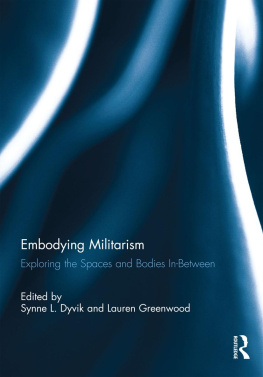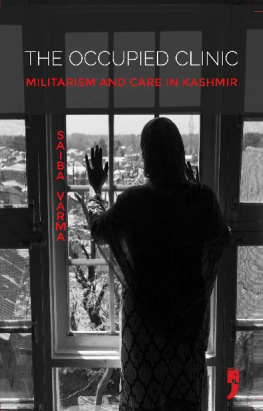Embodying Militarism
How are militarism and militarisation embodied and why is it important to study these concepts together? This volume highlights a lack of research into peoples emotions, bodies and experiences in global politics, and brings these important dimensions to bear on how we study militarism and processes of militarisation.
This collection showcases innovative research that examines peoples everyday lived experience and the multiple ways militarism is enshrined in our societies. Emphasising the benefits of interdisciplinary thinking, its chapters interrogate a range of methodological, ethical, and theoretical questions related to embodiment and militarism from a range of empirical contexts. Authors from a variety of disciplinary backgrounds reveal the myriad of ways in which militarism is experienced by gendered, raced, aged, and sexed bodies. The volume covers a wide range of topics, including the impact of social media; gender, queer, and feminist research on the military; the challenges of writing about embodied experience; and the commercialisation of military fitness in civilian life.
This book fills a gap in the study of militarism and militarisation and will be of interest to students and scholars of critical military studies, security studies, and war studies.
This book was originally published as a special issue of the journal Critical Military Studies.
Synne L. Dyvik is a Lecturer in International Relations at the University of Sussex, UK.
Lauren Greenwood is a Social Anthropologist at the University of Sussex, UK, and a former British Royal Naval Reservist.
Embodying Militarism
Exploring the Spaces and Bodies In-Between
Edited by
Synne L. Dyvik and Lauren Greenwood
First published 2018
by Routledge
2 Park Square, Milton Park, Abingdon, Oxon, OX14 4RN, UK
and by Routledge
711 Third Avenue, New York, NY 10017, USA
Routledge is an imprint of the Taylor & Francis Group, an informa business
Chapter 2, originally published as Open Access 2018 Peter Adey, David Denney, Rikke Jensen and Alasdair Pinkerton
Introduction, Chapter 1 & Chapters 312 2018 Taylor & Francis
With the exception of Chapter 2, no part of this book may be reprinted or reproduced or utilised in any form or by any electronic, mechanical, or other means, now known or hereafter invented, including photocopying and recording, or in any information storage or retrieval system, without permission in writing from the publishers. For details on the rights for Chapter 2, please see the chapters Open Access footnote.
Trademark notice: Product or corporate names may be trademarks or registered trademarks, and are used only for identification and explanation without intent to infringe.
British Library Cataloguing in Publication Data
A catalogue record for this book is available from the British Library
ISBN 13: 9781138715196
Typeset in Minion Pro
by RefineCatch Limited, Bungay, Suffolk
Publishers Note
The publisher accepts responsibility for any inconsistencies that may have arisen during the conversion of this book from journal articles to book chapters, namely the possible inclusion of journal terminology.
Disclaimer
Every effort has been made to contact copyright holders for their permission to reprint material in this book. The publishers would be grateful to hear from any copyright holder who is not here acknowledged and will undertake to rectify any errors or omissions in future editions of this book.
Contents
Citation Information
The chapters in this book were originally published in Critical Military Studies, volume 2, issue 12 (AprilAugust 2016). When citing this material, please use the original page numbering for each article, as follows:
Chapter 1
Introduction Embodying militarism: exploring the spaces and bodies in-between
Synne L. Dyvik and Lauren Greenwood
Critical Military Studies, volume 2, issue 12 (AprilAugust 2016), pp. 16
Chapter 2
Blurred lines: intimacy, mobility, and the social military
Peter Adey, David Denney, Rikke Jensen and Alasdair Pinkerton
Critical Military Studies, volume 2, issue 12 (AprilAugust 2016), pp. 624
Chapter 3
You do not live in my skin: embodiment, voice, and the veteran
Sarah Bulmer and David Jackson
Critical Military Studies, volume 2, issue 12 (AprilAugust 2016), pp. 2540
Chapter 4
Sexy warriors: the politics and pleasures of submission to the state
Jesse Paul Crane-Seeber
Critical Military Studies, volume 2, issue 12 (AprilAugust 2016), pp. 4155
Chapter 5
Of bats and bodies: methods for reading and writing embodiment
Synne L. Dyvik
Critical Military Studies, volume 2, issue 12 (AprilAugust 2016), pp. 5669
Chapter 6
Researching from the spaces in between? The politics of accountability in studying the British military
Harriet Gray
Critical Military Studies, volume 2, issue 12 (AprilAugust 2016), pp. 7083
Chapter 7
Chameleon masculinity: developing the British population-centred soldier
Lauren Greenwood
Critical Military Studies, volume 2, issue 12 (AprilAugust 2016), pp. 84102
Chapter 8
Doing military fitness: physical culture, civilian leisure, and militarism
Kevin McSorley
Critical Military Studies, volume 2, issue 12 (AprilAugust 2016), pp. 103119
Chapter 9
Writing about embodiment as an act of translation
Catherine Baker
Critical Military Studies, volume 2, issue 12 (AprilAugust 2016), pp. 120124
Chapter 10
Somatic soldier: embodiment and the aesthetic of absence and presence
Torika Bolatagici
Critical Military Studies, volume 2, issue 12 (AprilAugust 2016), pp. 125132
Chapter 11
Sounds of silence: reflections on songwriting and international relations
Susanna Hast
Critical Military Studies, volume 2, issue 12 (AprilAugust 2016), pp. 133136
Chapter 12
Diary of a plastic soldier (extracts)
Pip Thornton
Critical Military Studies, volume 2, issue 12 (AprilAugust 2016), pp. 137138
For any permission-related enquiries please visit:
http://www.tandfonline.com/page/help/permissions
Notes on Contributors
Peter Adey is a Professor at the Department of Geography, Royal Holloway University of London, UK.
Catherine Baker is Director of MA Provision and Lecturer in 20th Century History at the University of Hull, UK.
Torika Bolatagici is a Lecturer in Art and Performance at the School of Communication and Creative Arts, Deakin University, Australia.
Sarah Bulmer is a Faculty Member at the Department of Politics, University of Exeter, UK.
Jesse Paul Crane-Seeber is based at North Carolina State University, USA.
David Denney is a Professor at the School of Law, Royal Holloway University of London, UK.
Synne L. Dyvik is a Lecturer in International Relations at the University of Sussex, UK.








